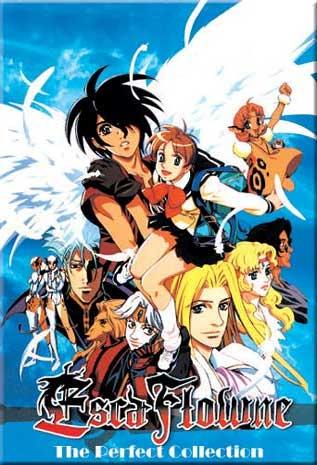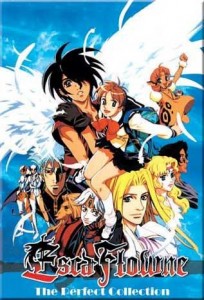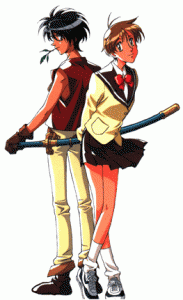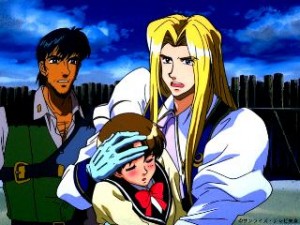It was a funny coincidence that I decided that I would embark on a rewatch of The Vision of Escaflowne and finished the first disc the day before Funimation announced that they’d acquired rights to make this classic anime available again. I haven’t watched a ton of anime, but Escaflowne is by far my favorite series. Every two years or so I decide to watch it again, and I’m generally fine with just watching a show once or twice. This show really rewards those who see it multiple times, as the characterization, setting, and storyline are so rich and complex, I often feel like I find something new to appreciate with each viewing. I’ll see if I can work through my old Bandai DVDs by the time the new edition from Funimation comes out, and feel free to dig out your copies of Escaflowne and join me in a rewatch in anticipation of what Funimation decides to do with the rerelease.
Hitomi the heroine of the show is sympathetic without being cloying. She’s a bit of a jock, as she’s dedicated to her track team. Hitomi also indulges in a bit of mysticism as she’s her school’s resident tarot card reader. She has a goofy crush on the captain of the boys’ track team at her school, and she spends plenty of time with her best friend awkwardly blushing and obsessing about him. Hitomi starts seeing visions as she’s running of destruction, giant metal monsters, and a young boy fighting. Her visions become true as Van Fanel appears on the high school track, pursued by a dragon. Hitomi and her friends narrowly escape while Van kills the dragon, but Hitomi and Van are carried off to to his world Gaea, where Earth appears as a second moon in the sky.
Van is the reluctant prince of the country Fanelia, a place with a strong martial arts tradition, a missing older prince (this is significant), and a hazardous habit of sending out future rulers to slay dragons as a rite of passage. Van has a habit of initially addressing Hitomi by yelling “Hey Girl!” (and not in a Ryan Gosling sort of way) but he seems to call her by her first name whenever she’s in danger. Van seems to be doing the best he can in a role he doesn’t want, but he’s affected by violence and doesn’t particularly want to fight even though he can be good at it.
The world of Gaea is an interesting place. It is quasi-medieval, but people have ancient mecha called Guymelefs. There’s a bit of a steampunk and mystical vibe to the technology shown on Gaea, as you see cogs and gears snap into position, and the mecha seem to have the creaky joints of old machines. In addition to humans, there are humanoid animals that live on Gaea as well, with the most prominent being Van’s catgirl Merle. There’s trouble for Fanelia as the Zaibach Empire has cloaking technology for their mecha (like the Romulans!), and an insane military captain in the form of the androgynous and dangerously emotionally unstable Dilandau. Fanelia is razed to the ground and Van is suddenly a prince without a country. He manages to escape with Hitomi and his country’s greatest treasure – the Escaflowne Guymelef.
As Van and Hitomi try to figure out what to do, they fall in with Allen Shezar, whose talents as a swordsman are rivaled only by the puffiness of his sleeves. Alan is a Knight of the country Asturia, and he leads a somewhat piratical crew aboard the airship The Crusade. Hitomi promptly develops a crush on Allen, while Merle jealously guards Van’s attention. One of the things I enjoy about this series is that the world seems so rich, and there is plenty to think about between viewings. What were Allen’s adventures aboard his airship? How did Van and Merle develop a close bond? The world of Escaflowne just seems to exist in a special place where there’s space to ponder the history and relationships between the characters going beyond just the animated episodes.
The show was developed in 1996, but despite the limitations of animation at the time, it doesn’t feel all that dated. The rich setting combined with the strong orchestral and vocal score give the series an epic feel. The theme of the horrors of war and violence is established early, as the fighting provoked by the Zaibach Empire is portrayed as devastating, not glamorous. Even though I’ve probably seen Escaflowne already 5 or 6 times, it sill seemed fresh and interesting when I watched it again, which is the mark of a series that is just timeless. I’m looking forward to watching the rest of my old DVDs now and finding out more about the new edition of this series coming soon.



